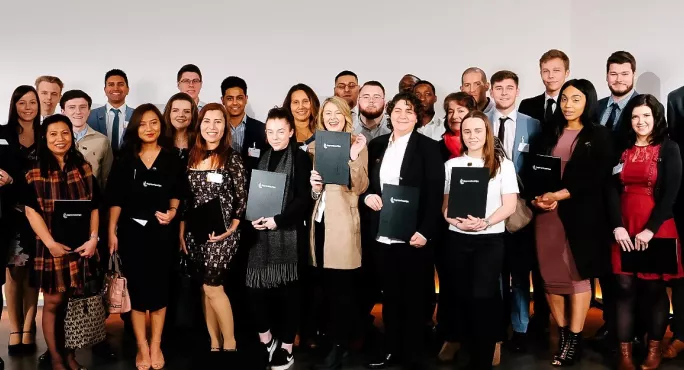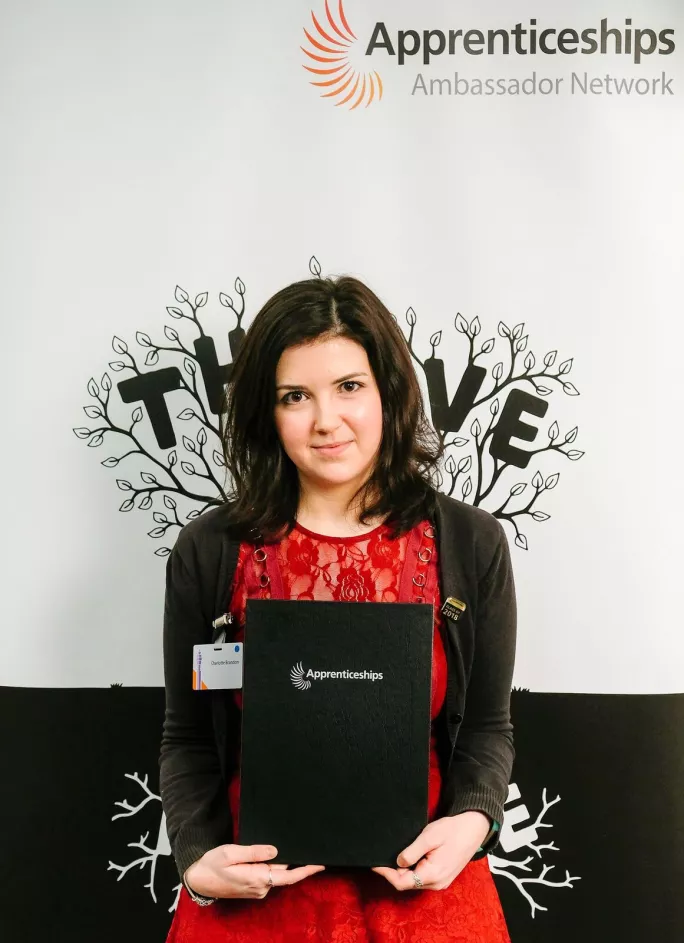- Home
- ‘There was a debate over gowns’ - Apprentices toast success with graduation ceremonies
‘There was a debate over gowns’ - Apprentices toast success with graduation ceremonies

What makes a graduation ceremony a graduation ceremony?
Traditionally, in the UK at least, it is a ritual rooted in the traditions of ancient universities and is a rite of passage for undergraduates and post-graduates alike. In North America, the term is used much more loosely to refer to completing any kind of academic study or training. For example, each year millions of US high schoolers have graduation ceremonies, often in full gowns and with mortarboards.
For the first time this year, the government’s National Apprenticeship Service organised a series of graduation ceremonies across the country.
All across England
The first England-wide apprenticeship graduations took place during National Apprenticeships Week and were held in Brighton, Cambridge, Leeds, Weston-super-mare and London - although a graduation ceremony planned for Birmingham had to be cancelled because of a low level of interest.
But gowns, mortarboards and graduates - in the traditional sense - were conspicuously missing. “We felt we shouldn’t try and mimic,” said Neil Weller, who was involved with organising one of the graduation ceremonies in London.
The partner at Troup Bywaters + Anders stressed that the word “graduation” does not belong to universities as it means to move up to a more advanced level or position.
Debate about gowns
“There has been some debate about whether to wear gowns or not,” Ann Potterton, a senior HR professional at BT Apprenticeships said. “Because it’s not the same thing. But it is about taking a moment to say well done and feel proud about what the apprentice has achieved.”
She said it was about celebrating the value of apprenticeships and making a statement about the positive impact apprentices have on businesses, adding: “We as employers are really proud.”
“We have got to change a whole generation’s view,” Weller added. “It is really important. You have got to say you’re not second best. We shouldn’t devalue what they are achieving.”
He said this was just as important for those completing level 2 or 3 apprenticeships as it was for those completing higher apprenticeships.
My business is going to flourish because they are going to flourish
“For some people that is the level they want to get to. If that’s the level you’ve achieved then celebrate it. Level 2 or 3? That’s great, that’s a real achievement. That’s why we feel these events are important. You’ve had to achieve something really big to do that.”
He said it would be good to encourage more parents to come along. “Maybe next year we will do something slightly bigger and build on the success of this year. The more family and friends who attend means more attitudes we will change. It’s not just about celebrating what they have achieved but getting the message out there. My business is going to flourish because they are going to flourish.”
The apprenticeship journey
At London’s BT Tower, 34 “graduates” - including 25 from level 2 and 3 apprenticeships and nine for levels 4 and 5 - celebrated their achievements with family and friends last month.

Charlotte Brandom, who works for BT and has recently completed her level 4 apprenticeship in IT and networking, went straight from sixth form to university to study psychology but “hated it” after a few months. “It was the job prospects I was worried about. I thought I could make a better career with an apprenticeship.”
She said initially her family took some convincing it was the right move. “No-one in my family had really done an apprenticeship,” but once they saw the advantages they got on board. “I’m the only one out of my group of friends to do an apprenticeship and some have said they wished they had done an apprenticeship.”

Megan Whitbread has completed her level 3 building services engineer apprenticeship and works at Troup Bywaters + Anders Engineering Partnership. “When I was in sixth form, the default was to go to uni. If you weren’t going to uni, it was assumed you had got everything sorted out. I really wish I had not had that type of environment.”
Now she is a Young Apprentice Ambassador and is working to encourage other youngsters, particularly women, to follow her footsteps into a technical apprenticeship. “It’s about getting the message out there that it’s not ‘second class’ to uni.”

Shandon Aubrey completed a level 5 apprenticeship in leadership and management for young people and adults in a residential setting. As someone who already worked at a senior level in the social care sector, the apprenticeship was about getting the qualification he needed to take the next step in his career.
“It has helped me get promoted. I was able to earn while I was learning. I would advise anyone to go down that route. A few managers I’ve worked with are thinking about doing the same now.”
Want to keep up with the latest education news and opinion? Follow Tes FE News on Twitter, like us on Facebook and follow us on LinkedIn
Keep reading for just £1 per month
You've reached your limit of free articles this month. Subscribe for £1 per month for three months and get:
- Unlimited access to all Tes magazine content
- Exclusive subscriber-only stories
- Award-winning email newsletters



